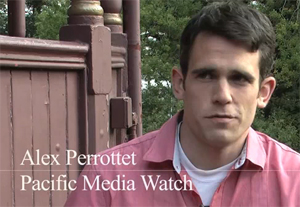
OPINION: SUVA (Pacific Media Watch): Here in Fiji, press freedom is not taken for granted. From the time of the military coup in 2006 until only recently, there was strict censorship of the press, and other basic freedoms of association and speech were curbed.
Since the lifting of the Public Emergency Regulations (PER), which had included uniformed military in some newsrooms, press freedom is slowly being afforded to media. However, the Media Industry Development Decree is in place and it provides for tough fines and even jail sentences for journalists that step over the line.
Figuring out just where that line is will be the challenge for media in the following months and indeed in the lead-up to the promised elections of September 2014. The Fiji government has commenced a public consultation process for its new constitution, and has promised regional leaders that there will be no press censorship as part of that process.
The forming of the consultation body was the trigger for Australia to re-engage with Fiji, according to Foreign Minister Bob Carr. He and New Zealand counterpart Murray McCully told journalists in Fiji on Tuesday that even critics of the Fiji administration had joined others to make “bold statements” ensuring that democracy was well on its way.
But even in a democracy, like Australia and New Zealand, whose respective foreign ministers were here this week, press freedom is never a fait accompli. As long as there are people in power with important information, there will be efforts to suppress it and re-package the truth to suit their purposes.
In New Zealand, where quality reporting is done on a shoestring, thanks to ever-decreasing government funding for public broadcasting, investigative journalist Jon Stephenson is busy reporting on Afghanistan. He is also slowly but surely rebuilding his reputation after the Prime Minister publicly derided his record following a revealing report on the New Zealand military actions in Metro magazine.
Thanks to Russell Brown and Media7 (TVNZ’s media-focused programme), Stephenson has been able to get some air time in his own country. But alas, by the middle of the year, funding will run out for Brown’s programme and the informative public digital TV channel.
Another form of censorship
You could argue it’s censorship of a different sort.
In Australia, media inquiries and reports are falling from the sky like torrential Fijian rains, and there’s more than one Chicken Little running around saying the sky is falling.
The Convergence Review report has been released by the government and it recommends a more powerful statutory body to regulate the media, specifically in the areas of media ownership, content standards and the production of local content.
The previous attempt was the Finkelstein Report, which recommended government involvement. A bitter war of words broke out between media personnel of the News Limited variety and media academics who had found encouragement in the findings of the Finkelstein Report and argued that the free market could not ensure a free press.
The argument in favour of more regulation came from those who have had some distance from the coalface of the profession; the shrill argument against from those who fear curbs on their own reporting.
But like a case of defamation, a journalist need not worry if they have all the facts, and can argue that a story was fair, balanced and accurate.
In New Zealand, the Broadcasting Standards Authority (BSA) is a respected body that has issued fines in the past on very revealing investigative stories, such as Barbara Dreaver’s controversial report from Samoa on "Guns and Drugs". Most New Zealand journalists would not see that action as all that threatening.
Remarkable new precedent
However, even if a journalist is able to defend themselves, a remarkable new precedent against free speech was set in Australia recently. Controversial blogger and broadcaster Andrew Bolt was forced to apologise for remarks of opinion based on fact when the Racial Discrimination Act was wielded against him by a class action of fair-skinned indigenous Australians.
The article has been suppressed. The precedent has set a new frontier in the war on “hate media” as the now retired Greens senator Bob Brown dubbed the Murdoch press (owners of The Fiji Times until 2010)..
But the right to be offended is not just a matter for journalists to take care about. Company executives throw their weight around just as much as politicians and judges. A young employee of Qantas was recently dragged over the coals for remarks made on a personal Twitter account that offended a member of the public. The offended person had presumably used the Twitter name to search for the employee online, tracked down the personal Facebook account and ascertained the full name and employer.
Although the employee’s direct managers sided with the right to publish personal views on Twitter, the human resources department disagreed and attached a report to the employee’s file, prompting the employee to immediately delete the Twitter account.
Perhaps Qantas should focus on pitching its own social media efforts better rather than worry about its employees. After last year’s industrial dispute, Qantas launched its #qantasluxury promotion on Twitter which promptly fell out of the sky, crashed and burned.
In New Zealand, in the lead-up to the Rugby World Cup last year, major sponsor ANZ issued a number of reminders and warnings to its employees about what could and could not be said on personal social media accounts. Stringent directives banning any criticism of any person, team, player or event were issued.
It brought a whole new meaning to ANZ’s RWC marketing campaign of “welcome to losing your voice”.
Unpredictable military regime
Back in Fiji, media personnel are in sharp disagreement about what is the best approach to take with an unpredictable military regime supposedly rolling towards a new democracy.
‘Development journalism’ has been called for, and is a much wider-respected media approach in other developing countries in the Asia-Pacific regime. More cautious voices usually from Western media approaches see the developmental approach as simply a tool to be appropriated by governments to broadcast their agenda, as dictator Ferdinand Marcos did in the Philippines decades ago.
The Philippines incidentally gives us a bit of perspective about media freedom. In 2009, there were 34 journalists in the group of 57 people brutally murdered while following a political event in Maguindanao, or Ampatuan province. Justice is still waiting to be served in a worringly slow trial.
Indeed journalists in developing countries have it tough and many do an amazing job toeing the unclear line to bring information to the public. Trawling through editions of The Fiji Times as part of my research here, there is more quality journalism on issues that affect the everyday person than I have ever seen in a newspaper in Australia or New Zealand.
And that is an often-forgotten aspect of media freedom – the right of the public to be informed, not just the right for journalists to be heard.
Sure there are difficulties here in the Pacific with holding power to account. Tradition and custom, as special as they are, can often be a stumbling block for getting answers. But not all journalism is ‘horse-race’ politics and in fact a great deal of it isn’t. That’s a lesson the Pacific can teach its two big brothers many times over.
Alex Perrottet is in Fiji for the UNESCO World Press Freedom Day (WPFD) events. He has been assisted by the AUT Pacific Media Centre and University of the South Pacific. This article is adapted from his speech.
This work is licensed under a Creative Commons Attribution-NonCommercial 3.0 New Zealand Licence.




